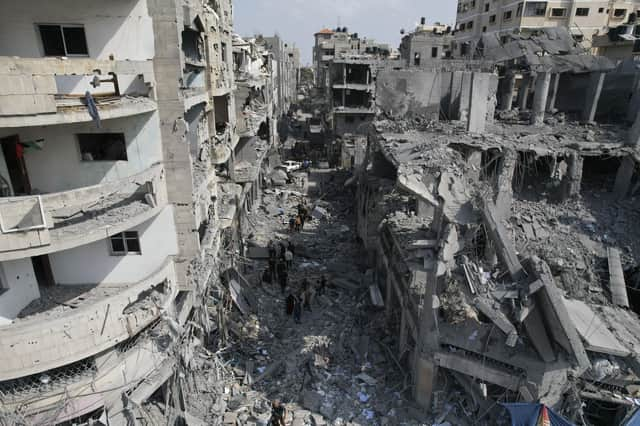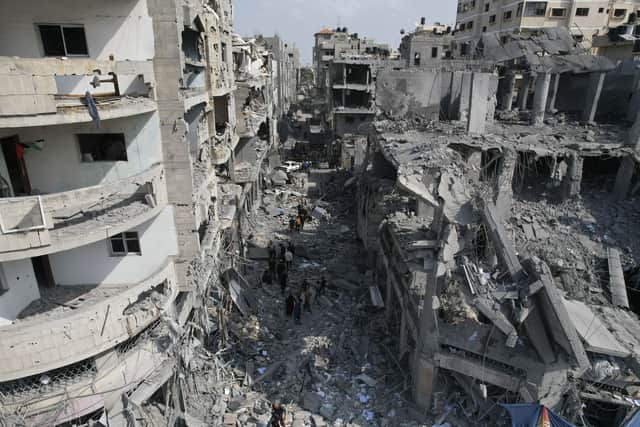Israel - Hamas: ground offensive to be launched in Gaza as civilians urged to move south


Israel expects to launch a long and difficult ground offensive into Gaza soon to destroy Hamas, the country’s defence minister said after describing a campaign to dismantle a vast network of tunnels used by the territory’s militant rulers.
Yoav Gallant spoke to a small group of foreign reporters in Tel Aviv after Israeli forces backed by fighter jets and drones carried out a second, limited ground raid into Gaza in as many days, striking the outskirts of Gaza City.
Advertisement
Hide AdAdvertisement
Hide AdGallant said the ground invasion follows weeks of air strikes “will take a long time”, and will lead to another lengthy phase of lower-intensity fighting as Israel destroys “pockets of resistance”.


In a sign of the rising tensions in the region, US war planes earlier struck targets in eastern Syria which the Pentagon said were linked to Iran’s Revolutionary Guard after a string of attacks on American forces, and two mysterious objects hit towns in Egypt’s Sinai Peninsula.
After three weeks of war sparked by a bloody Hamas incursion into southern Israel, the Palestinian death toll has soared past 7,300, according to officials in Gaza and a blockade on Gaza has meant dwindling supplies of food, fuel, water and medicine, and UN and Arab leaders have called for a ceasefire to allow entry of humanitarian aid that is only trickling in.
Palestinian telecom provider Paltel said internet service in the Gaza Strip has been cut off by the Israeli bombardment.
Advertisement
Hide AdAdvertisement
Hide AdServices were cut on Friday evening following a heavy round of Israeli air strikes that lit up the sky over the territory.
The Palestinian Red Crescent, the main emergency service in Gaza, said it was cut off from its operations room because of the internet blackout.
Gaza’s health ministry released a detailed list of names and identification numbers of those killed, including more than 3,000 minors and more than 1,500 women after more than 1,400 people died in Israel during Hamas’ 7 October attack, according to the Israeli government, and at least 229 hostages were taken into Gaza.
A ground invasion is expected to cause even higher casualties on both sides as Israeli forces and Hamas battle each other in dense residential areas.
Advertisement
Hide AdAdvertisement
Hide AdHospitals have been scrounging for fuel to run emergency generators that power incubators and other life-saving equipment after Israel cut off all fuel deliveries to Gaza at the start of the war, forcing its only power plant to shut down.
Mr Gallant said Israel believes that Hamas would confiscate any fuel that enters. He said Hamas uses generators to pump air into its hundreds of miles of tunnels, which originate in civilian areas and showed reporters aerial footage of what he said was a tunnel shaft built right next to a hospital.
“For air, they need oil. For oil, they need us,” he said.
Little is known about Hamas’ secretive tunnels and other infrastructure, and it was not possible to independently confirm Mr Gallant’s claims.
Lynne Hastings, the UN aid coordinator for the Palestinian territories, declined to comment on Mr Gallant’s remarks, saying: “We don’t know what Hamas has or doesn’t have. We have been bringing fuel into Gaza in coordination with the government of Israel for decades. We know fuel is a high-risk item and are working with the Israelis to make sure what we will be using for our operations is done securely.”
Advertisement
Hide AdAdvertisement
Hide AdThe UN agency for Palestinian refugees, which provides basic services to hundreds of thousands of people in Gaza, said it has been forced to ration fuel among lifesaving machines in hospitals, bakeries, and desalination plants, and only has enough for a few more days.
Philippe Lazzarini, the head of UNRWA, told reporters: “The siege means that food, water and fuel – basic commodities – are being used to collectively punish more than two million people, among them, a majority of children and women.”
Around 1.4 million of Gaza’s 2.3 million residents have fled their homes, with nearly half of them crowding into UN shelters as hundreds of thousands remain in northern Gaza, despite Israel ordering them to evacuate to the south and saying that those who remain might be considered “accomplices” of Hamas.
Over the past week, Israel has allowed more than 80 trucks with aid enter from Egypt through the Rafah crossing, the only entry point into Gaza not controlled by Israel. But aid workers say the convoys meet only a tiny fraction of the territory’s mounting humanitarian needs.
